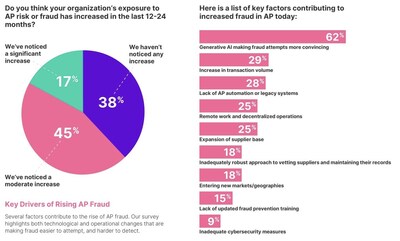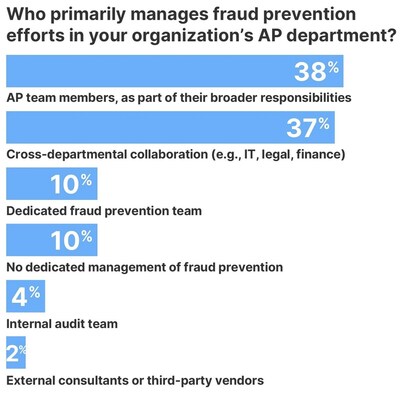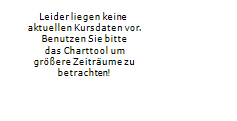
- 62% of businesses cite generative AI as a key driver behind the surge in invoice fraud
- 7 out of 10 organizations were victims of fraud in 2024
- 90% lack experience in fraud prevention teams
- The perfect storm of challenges: new survey identifies company exposure to invoice fraud and lack of protection measures, causing global losses of $485bn
CHARLOTTE, N.C., Dec. 18, 2024 /PRNewswire/ -- Two-thirds of businesses (62%) cite generative AI as a key driver behind the surge in invoice fraud, according to a new global survey. This increases difficulty in distinguishing between legitimate and fraudulent documents, as attacks grow in volume and sophistication.

Alongside this issue, 90% of organizations lack dedicated fraud prevention teams, forcing accounting staff to juggle fraud management beside their regular responsibilities, often straining resources and increasing vulnerability.
The findings were revealed in invoice automation company Basware's 'The Rise in AP Fraud' report, conducted by sharedserviceslink. The study surveyed 100 global business leaders and CFOs on the exposure companies have to financial fraud and what protection measures they have in place.
Fraud is a global $485bn issue
Fraud is becoming increasingly frequent, sophisticated, and damaging for businesses. In 2024, seven out of 10 organizations (68%) reported fraud attempts, with 62% noting these attempts had worsened over the past year.
The financial impact is staggering. Last year, fraud schemes, including bank fraud, resulted in global losses of $485 billion.
Remote work and decentralized operations are seen as key contributors of this surge, as identified by a quarter (25%) of respondents. By weakening internal controls, remote work exposes accounts payable (AP) departments to greater vulnerability, making it harder to prevent fraudulent activities.
At the same time, roughly a quarter of respondents also point to rising transaction volumes (29%) and the expansion of the supplier base (25%) as critical risk factors. With more invoices to process and a larger number of suppliers to manage, AP teams face greater complexity, which increases the likelihood of errors or fraud.
Together, these external threats create a perfect storm of challenges, making it easier for fraudsters to exploit weaknesses in the AP workflow.
GenAI used to create millions of illegitimate invoices
AP departments are on the frontlines of fraud detection, while also managing supplier payments, leaving them overwhelmed by the complexity and growing volume of fraudulent attempts.
Increasingly sophisticated tactics, such as fake invoices, deepfake media, and phishing scams - driven by generative AI - have made attacks more convincing and harder to detect. As a result, two-thirds (62%) of businesses now cite generative AI as a key driver behind the surge in AP fraud.
Tools such as ChatGPT enable the mass creation of communications and fake invoices, increasing risks and delays in resolving legitimate disputes. When handled by multiple disconnected systems, information becomes fragmented, making patterns harder to spot and allowing fraud to slip through undetected.
A high-impact case of AP fraud involved a man from Lithuania, who defrauded Facebook and Google out of more than $120 million by posing as a legitimate supplier. Using fake invoices, he secured $99 million from Facebook and $23 million from Google. The fraud underscored how vendor impersonation and fake invoices can cause massive financial losses without robust AP safeguards, even for large enterprises.
According to the survey, 90% of organizations lack dedicated fraud prevention teams, causing understaffed and under-resourced AP teams to prioritize speed over detailed checks, creating vulnerabilities. Meanwhile, reliance on paper-based processes and inadequate statement reconciliation leaves teams exposed to errors, inefficiencies, and fraudulent activities.
Tom Santacroce Global VP of AP Assurance, commented on the findings:
"Manual processes are inherently slow and prone to errors, making it difficult to match invoices, track approvals, or identify duplicate payments - creating exploitable gaps for fraudsters, who are now using GenAI. For overburdened AP teams, these create the perfect storm of challenges, leading to operational bottlenecks, strained supplier relationships, and lost cash flow.
"Forward-thinking organizations are reimagining fraud, overpayment and risk prevention through AI and automation that protects against increasingly complex financial threats. Remote work has weakened traditional security, requiring secure systems and innovative solutions like decentralized finance and blockchain for transparent vendor transactions. With increasingly sophisticated fraud tactics on the uptick, organizations must prepare for stricter AI and compliance rules. Proactive fraud prevention today not only mitigates risk, but also future-proofs operations against costly penalties."
How enterprises can combat fraud
AP fraud is one of the most targeted types of fraud for businesses. According to the survey, 28% of organizations cite a lack of AP automation to help tackle fraud. Reliance on manual processes and outdated tools leaves businesses ill-equipped to manage complex, high-volume transactions, creating critical gaps for fraudsters to exploit.
One example of how automation has strengthened AP fraud prevention is KION, a global leader in forklift trucks and warehouse equipment, who were previously vulnerable to fraud risks due to manual invoice processing.
To address these challenges, KION partnered with Basware, shifting to automated AP processes driven by AI that significantly reduced manual errors, minimizing fraud opportunities. With over 90% of its spend now controlled, KION has streamlined its operations, providing better visibility, control, and oversight - ensuring that invoices and payments are accurately validated, reducing the risk of errors or AP fraud.
For the full report, visit: https://www.basware.com/en/resources/the-rise-in-ap-fraud-frequency-sophistication-and-impact
About Basware??
Basware is how finance leaders in global enterprises can finally automate their complex, labor-intensive invoice processes and stay compliant with regulatory change. Our AP automation and invoicing platform helps you achieve a new level of efficiency - in a matter of months - while reducing errors and risks. We bring a unique combination of true automation, complete coverage, and deeper expertise to make it all just happen for our customers. That's why the world's most efficient AP departments at thousands of companies rely on Basware to handle over 220 million invoices per year. With Basware, Now it all just happens.?
Photo - https://mma.prnewswire.com/media/2583049/Rise_in_AP_Fraud.jpg
Photo - https://mma.prnewswire.com/media/2583047/Key_Factors.jpg
Photo - https://mma.prnewswire.com/media/2583048/Who_primarily_manages.jpg
Logo - https://mma.prnewswire.com/media/2398888/Basware_logo.jpg



![]() View original content:https://www.prnewswire.co.uk/news-releases/two-thirds-of-businesses-blame-genai-for-fraud-surge-302334046.html
View original content:https://www.prnewswire.co.uk/news-releases/two-thirds-of-businesses-blame-genai-for-fraud-surge-302334046.html


